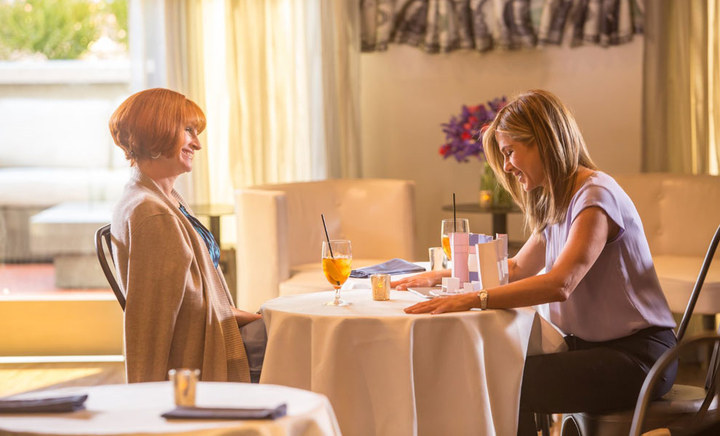
Julia Roberts and Jennifer Aniston in Mother's Day.
Ron Batzdorff / Open Road Films
1. Julia Roberts sits in an Atlanta cafe staring pensively out the window at a train going by. She's playing Miranda Collins, a HSN host who, somehow, is so famous that people shout out her name when they see her on TV and enter contests in order to have a picture taken with her.
She is in Atlanta hawking a line of mood pendants for Mother's Day, and — because this is the latest star-stuffed Garry Marshall holiday pileup — so she can cross paths with some of the ensemble's other characters, including Kristin (Britt Robertson), who she placed for adoption as a baby.
Miranda's server comes by, and, like it's a totally normal question to put to a total stranger sitting by herself, asks if Miranda's a mom. Her eyes brim with regret over what might have been, and this movie will have her suggest more than once that what she's about to say is a one-or-the-other proposition for women.
No, she says, she has a career.
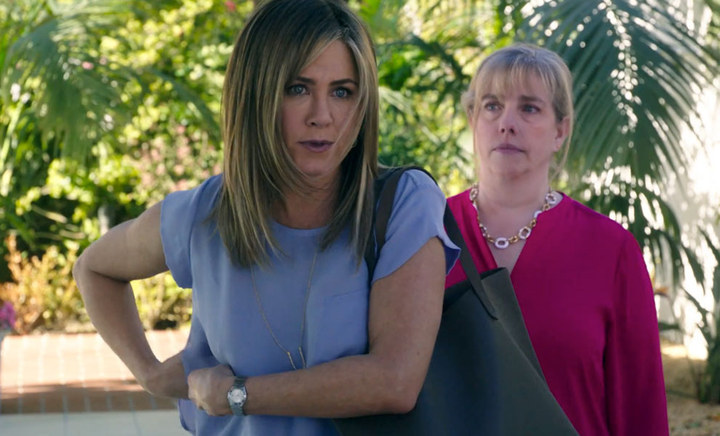
Aniston.
Open Road Films
2. Sandy (Jennifer Aniston), a divorced interior designer and mother of two, is running late to a job interview with Miranda. She's so tardy that Miranda's already moved on to a meet and greet, and security keeps blocking Sandy's path. While others might accept that they fucked up, not Sandy — Sandy is Having A Day. In rom-com pratfall fashion, she's ripped her blouse so that her bra is showing, and she chooses to explode into a rant about how she was late because she had to take some time out for a meltdown over her ex (Timothy Olyphant) remarrying a twentysomething (Shay Mitchell), and because her mom's car for some reason can't go very fast.
Sandy, who has crazy eyes and seems to forever be on her way to or from a workout, literally declares to a room, in this feature-length ode to the maternal experience, that she can't be held to normal standards because she's a mother. Miranda, that other half of the movie's argument that motherhood and serious careers are incompatible, is charmed and gives Sandy the gig, telling her the qualities that lead her to rant about her personal life to a room full of randos are ones that she shouldn't lose, because they get her attention.
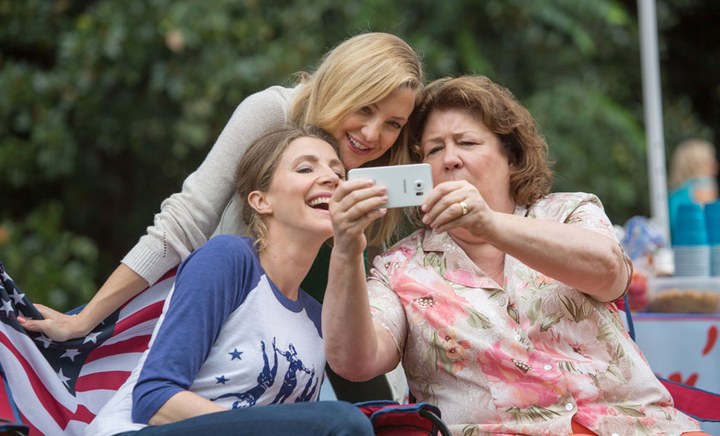
Sarah Chalke, Kate Hudson, and Margo Martindale.
Ron Batzdorff / Open Road Films
3. Russell (Aasif Mandvi) is married to Jess (Kate Hudson), but he's staying with her sister, Gabi (Sarah Chalke), because he's upset about having learned that all this time, his wife has been lying about her parents. They don't have dementia, as she claimed, they're actually racist homophobes who've driven up from Texas in their RV, waving fried chicken and wearing patriotic T-shirts, to surprise their children, only to discover to their distress that Jess is married to an Indian man and Gabi is married to a woman (Cameron Esposito).
Because this is meant to be a cuddly movie, the way the parents (played merrily by Margo Martindale and Robert Pine) call Russell "houseboy" and "towelhead" is presented with shockingly little bite, like it's all just a bump in the road before the allure of grandchildren smooths things over. But the act that finally unites the clan is the moment when, after some hijinks result in the cops being called, Russell emerges from the RV to officers reacting like they're going to tase or shoot him, either due to the color of his skin or the women's robe he's borrowing. His in-laws come to his defense, and it's all laughed off, because there's nothing like a lighthearted act of unprovoked and potentially deadly police violence to pull a family together.
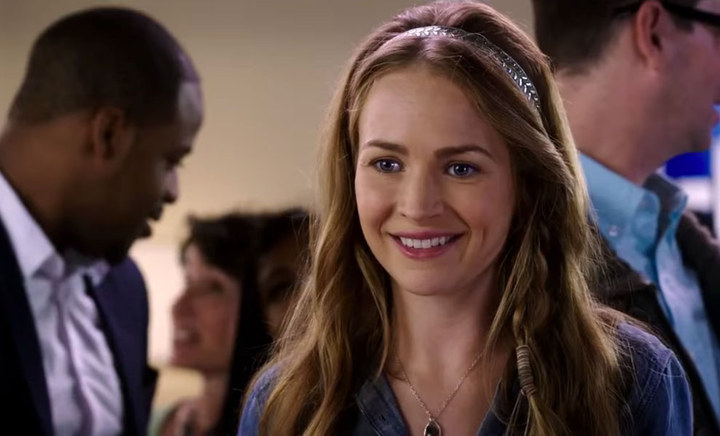
Britt Robertson.
Open Road Films
4. Miranda's biological daughter Kristin has a daughter of her own with Zack (Jack Whitehall), a bartender and aspiring comedian she's been with for five years but refuses to marry. She can't do it, she tells her friend Jesse (they met at Mommy and Me!), because until she gets up the nerve to contact her biological mother to find out why she was placed for adoption, she just doesn't feel like she knows who she is. Also, she has to think about the impact that a possible future divorce might have on her kid, though why she believes her child would have an easier time with her parents breaking up if they aren't wed is unclear.
Then, as if she weren't following in a stubborn movie tradition that draws a direct line between adoption and damage, she declares with the ponderous solemnity only the most unnecessary lines deserve, "I have abandonment issues."
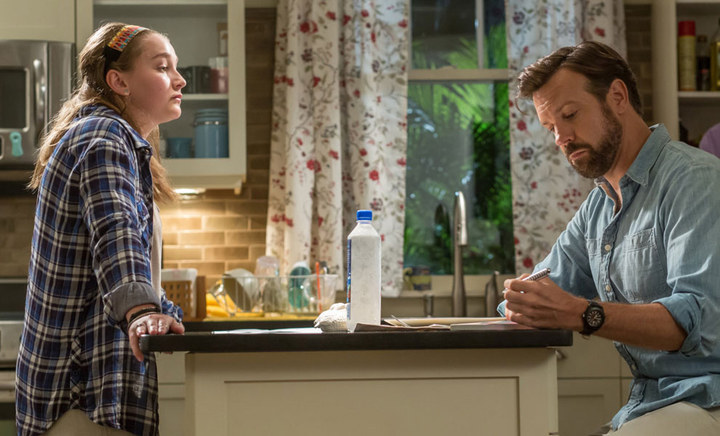
Jessi Case and Jason Sudeikis.
Ron Batzdorff / Open Road Films
5. Jason Sudeikis is Bradley, a widower and father of two who's still mourning his late wife (Jennifer Garner). He watches her old karaoke videos, communes with her car, and focuses the rest of his energies on coaching their older daughter's (Jessi Case) soccer team and spying on her burgeoning relationship in a way of avoiding getting back out there himself.
He's positioned as a love interest for Sandy, but, in the name of being relatably frazzled, she comes off as unbalanced, and Sudeikis's performance is so disengaged that Sandy's meet-cutes with Bradley leave him looking more like a man darting through hostile territory than one coming around to a new romance. It's hard to blame Bradley when, immediately after their first encounter, he witnesses Sandy having a steering wheel–pounding freakout in her car. (These qualities really do get her attention.) At the lowest ebb of this coupling, he actually hides, ducking behind the Lycra-clad form of a lady on a stair-climber, when he spots her headed to yoga class at his gym, like he's trying to reject his destiny entirely.
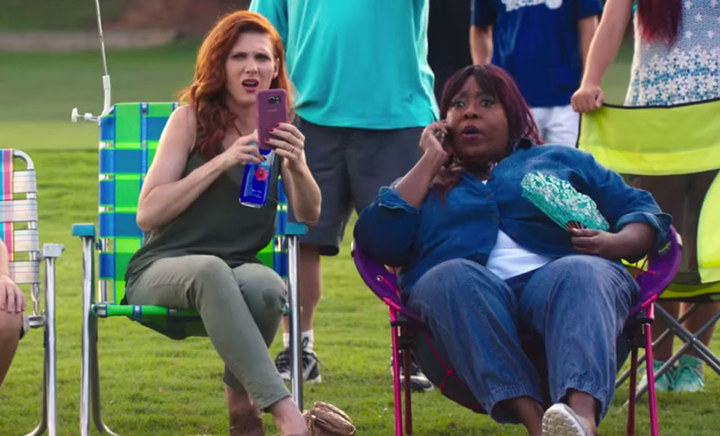
Loni Love.
Open Road Films
6. Kimberly (Loni Love) is, unbelievably, the only black character of any significance in Mother's Day, despite the movie being set in Atlanta. She's still minor, there to provide commentary on Bradley's life and to serve as the sort of comic relief that gets assigned to the fuller bodied — she, for instance, has trouble getting out of her lawn chair, which is the kind of visual gag that comes across as meaner in a movie that makes a point of being overstuffed with lithe blondes in athleisure wear calling each other about pilates class.
Kimberly is a fellow soccer parent of Bradley, and is part of a chorus of women who want to set him up and who nag him about what his Mother's Day plans are. And, without Bradley's permission, she brings his daughters to their mother's grave on the day in question, an act that's even more grossly inappropriate than needling a guy whose spouse is dead about how he and his daughters are going to mourn her while everyone else is out having brunch.
It's one of the many moments in which Mother's Day, which arrives in the wake of Marshall's Valentine's Day and New Year's Eve, reveals itself to be, not a movie celebration of motherhood, but one that plucks at the anxieties surrounding it like stitches being undone. Its total clunkiness aside, it never once manages to highlight a moment of triumph in its collection of characters, who are all certain they're doing things wrong — whether due to fears of their children preferring their spritely new stepmom, or because they've carried on a years-long campaign of avoiding their mother, or thanks to the way friends step in to take their children to the cemetery without asking them.
No one's asking Mother's Day to be a masterpiece, but it doesn't even manage the hokey "aw" that's the reason a movie like this exists. It's about parenting without a hint of pleasure, save for the film's insistence that opting out of it will leave you, like Miranda, sitting successful and alone, wondering what if.
by
No comments:
Post a Comment